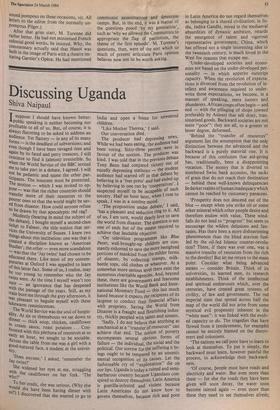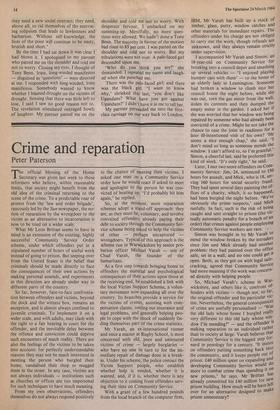Discussing Uganda
Shiva Naipaul
Isuppose I should have known better: public speaking is neither becoming nor profitable to all of us. But, of course, it is always flattering to be asked to address an audience. Yet flattery — in any of its many forms — is the deadliest of subversions; and even though I have been ravaged time and again by its fated and petty treasons, I still continue to find it (almost) irresistible. So when the World Service of the BBC invited me to take part in a debate, I agreed. I will not be pedantic and name the other par- ticipants. The innocent must be protected. The motion — which I was invited to op- Pose — was that the richer countries should transfer more of their resources to the Poorer ones so that the world might be sav- ed from disaster. How could anyone refuse to be drawn by that apocalyptic red rag?
Modestly (bearing in mind the subject of the debate), I bought myself a second-class ticket to Falmer, the title station that ser- vices the University of Sussex. I knew two things about this institution: one was that it created a discipline known as 'American Studies'; the other — even more scandalous
was that the 'Jay twins' had chosen to be educated there. Like most of my contem- poraries at Oxford I was appalled to learn of this latter fact. Some of us, I realise, may be too young to remember who the Jay twins were. At the time I myself wasn't too sure — an ignorance that has deepened with the passage of the years. Still, as my train bore me through the grey afternoon, it was Pleasant to beguile myself with these lukewarm reminiscences. The World Service was the soul of hospit- ality. At six or thereabouts we sat down to dinner — thick soup, chicken, cauliflower in cream sauce, roast potatoes ... Con- fronted with this plethora of resources at so early an hour, we sought to be sociable. Across the table from me was a girl with a good-natured face, a student at the univer- sity.
'Does anyone,' I asked, 'remember the Jay twins?' She widened her eyes at me, struggling with the cauliflower on her fork. 'The who?'
To her credit, she was serious. (Why else would she have been having dinner with us?) I discovered that she wanted to go to India and open a home for unwanted children. 'Like Mother Theresa,' I said.
Our conversation died. The producer had depressing news. While we had been eating, the audience had been voting. Sixty-three percent were in favour of the motion. The producer was kind. I was told that in the previous debate Tony Benn had conjured victory out of equally depressing statistics — the student audience had started off in that debate by believing in a ' free press' and had ended up by believing in one run by 'cooperatives'. I suspected myself to be incapable of such sorcery. Half an hour later, when I rose to speak, I was in a sombre mood. 'The proposition under debate,' I said, 'has a pleasant and seductive ring to it. All of us, I am sure, would dearly
love to save the world from disaster. The question iesn ot ot one of ends but of the meansrequird achieve that laudable objective. 'On television programmes like Blue Peter, well-brought-up children are con- stantly exhorted to save the more benighted opo rtdionasstoe, frmabnykienodilfereotimogthe milder forms of disaster, bottle tops, old clothes or wshtaamtepvs, er. milk- bottle ka- somewhat more serious level there exist the numerous charitable agencies. And, beyond these, there are governments and fearsome institutions like the World Bank and Inter- national Monetary Fund — this last much hated because it expects the recipients of its largesse to conduct their financial affairs with propriety. Saving the World from Disaster is a fraught and flourishing indus- try, thickly peopled with saints and sinners.
'Sadly, I do not believe that anything as mechanical as a "transfer of resources" can achieve that end. The notion of poverty encompasses several obvious forms of failure — the individual, the social and the political. Our sorrow for the suffering it br- ings ought to be tempered by an unsenti- mental recognition of its causes. Let the fashionable cry of "exploitation" die on our lips. Uganda is today a ruined and semi- barbarous country because Ugandans con- spired to destroy themselves; Latin America is guerilla-infested and violent because Latin Americans do not know how to govern themselves, because rich and poor in Latin America do not regard themselves as belonging to a shared civilisation; in In- dia, Indira Gandhi, mired in the mediaeval absurdities of dynastic ambition, retards the emergence of talent and vigorous representative government; China, which has offered not a single interesting idea to the twentieth century, is much loved in the West for reasons that escape me.
'Under-developed societies and econo- mies are based on the under-developed per- sonality — in which appetite outstrips capacity. When the revolution of expecta- tions is divorced from the revolution of in- tellect and awareness required to under- write those expectations, we become, in a manner of speaking, mere looters and plunderers. African coups often begin — and end — with the pillaging of shops (owned preferably by Asians) that sell shiny, tran- sistorised goods. Backward societies are not mere "poor": they are all, to a greater or lesser degree, deformed.
'Behind the "transfer of resources" argument lies the assumption that the only distinction between the advanced and the backward is a purely material one. It is because of this confusion that aid-giving has, traditionally, been a disappointing vocation. The money that is diverted to numbered Swiss bank accounts, the sacks of grain that do not reach their destination. — behind these well-known delinquencies lie darker realms of human inadequacy which cannot be reached by customary panaceas.
'Prosperity does not descend out of the blue — except when you strike oil or some other mineral which other people desire and therefore endow with value. These wind- falls do not lead to "progress" but seem to encourage the wildest delusions and fan- tasies. Has there been a more disheartening phenomenon than the blind atavism fuel- led by the oil-fed Islamic counter-revolu- tion? There, if there was ever one, was a massive transfer of resources from the rich to the derelict! But let me return to the main point. Consider what being advanced means — consider Britain. Think of its
universities, its learned men, its research establishments. Think of the intellectual and spiritual endeavours which, over the centuries, have created great systems of civility, of law and government. The red imperial stain that spread across half the map of the world did not arise from some mystical evil propensity inherent in the "white man": it was linked with the evolv- ed capacity to do. The tragedies that have flowed from it (enslavement, for example) cannot be entirely blamed on the discov- erers and colonisers.
'The nations we call poor have to learn to look at themselves. To put it simply, the backward must learn, however painful the process, to acknowledge their backward- ness.
'Of course, people must have roads and electricity and water. But even more than these — for else the roads they have been given will soon decay, the water soon become tainted again — even more than these they need to see themselves afresh;
they need a new social contract; they need, above all, to rid themselves of the enervat- ing solipsism that leads to lawlessness and barbarism. Without self-knowledge, the lives of the poor will continue to be nasty, brutish and short.'
By the time I had sat down it was clear I had blown it. I apologised to my partner who patted me on the shoulder and told me not to worry. Closing my eyes, I thought of Tony Benn. Irate, long-winded manifestos — disguised as 'questions' — were directed at me. I responded with long-winded, irate manifestos. Somebody wanted to know whether I blamed drought on the victims of drought. Sensing that there was little left to lose, I said I saw no good reason not to. The revelation stimulated outraged howls of laughter. My partner patted me on the shoulder and told me not to worry. With desperate fervour, I embarked on my summing-up. Mercifully, no more ques- tions were allowed. We hadn't done a Tony Benn. The majority in favour of the motion had risen to 83 per cent. I was patted on the shoulder and told not to worry. But my tribulations were not over. A pale-faced girl descended upon me.
'Who do you think you are?' she demanded. I repeated my name and laugh- ed when she punched me.
There was the pale-faced girl; and there was the black girl. 'I want to know why,' shrieked this last, 'you don't like Ugandans? What have you got against Ugandans?' I didn't have it in me to tell her.
My partner persuaded me into the first- class carriage on our way back to London.











































 Previous page
Previous page